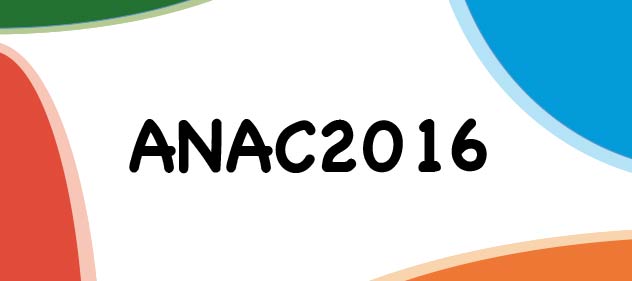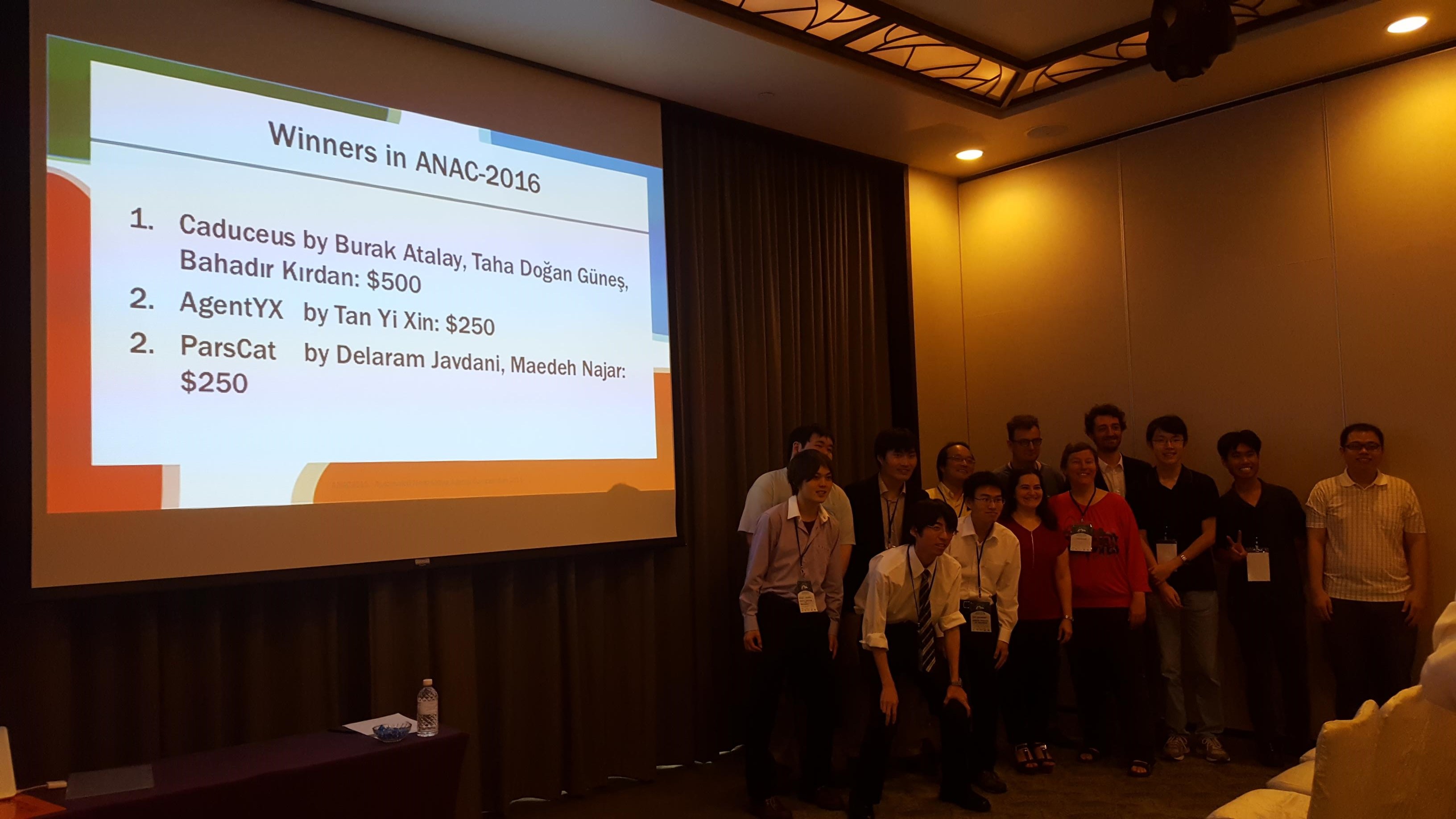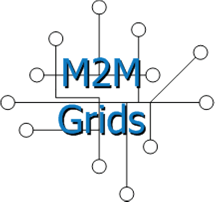
The Seventh International Automated Negotiating Agents Competition
To be held in conjunction with the International Joint Conference on Autonomous Agents and Multi-Agent Systems (AAMAS 2016), Singapore, 9-13th May 2016.

Winners in ANAC2016
1st: Caduceus by Burak Atalay, Taha Doğan Güneş, Bahadır Kırdan
2nd: AgentYX by Tan Yi Xin
2nd: ParsCat by Delaram Javdani, Maedeh Najar
News
May 25th, 2016: Winners in ANAC2016 and results of the final round are announced.
April 10, 2016: There has been delays in announcing the final results because of some problems. Please wait momentarily until announcing the finalists.
March 9, 2016: We fixed a bug and release a new version. Now, you need to use Genius 5.3.5.
February 17, 2016: Frequency asked questions are updated: here
February 4, 2016: ANAC2016 webpage was launched.
Overview of ANAC2016
The ANAC competition brings together researchers from the negotiation community and provides a unique benchmark for evaluating practical negotiation strategies in multi-issue domains. The previous competitions have spawned novel research in AI in the field of autonomous agent design which are available to the wider research community. The focus of this year's competition is on multi-party negotiation in smart energy grids.. The goals of the competition are:
- to encourage the design of practical negotiation agents that can proficiently negotiate against unknown opponents and in a variety of circumstances,
- to provide a benchmark for objectively evaluating different negotiation strategies,
- to explore different learning and adaptation strategies and opponent models, and
- to collect state-of-the-art negotiating agents and negotiation scenarios, and making them available to the wider research community.
Entrants
Entrants to the competition have to develop and submit an autonomous negotiation agent that runs on Genius. Genius is a Java-based negotiation platform in which you can create negotiation domains and preference profiles as well as develop negotiating agents. The platform allows you to simulate negotiation sessions and run tournaments. More details can be found by following this link: http://ii.tudelft.nl/genius/
Performance of the agents will be evaluated in a tournament setting, where each agent is matched with other submitted agents, and each set of agents will negotiate in a number of negotiation scenarios. One of the scenarios will be a smart energy grids scenario. Negotiations are repeated several times to obtain statistically significant results.
A negotiation scenario consists of a specification of negotiation issues and preferences of all negotiating parties. The preferences of a party are modelled using additive utility functions.
Rules of Encounter
Negotiations are multilateral and based on a multi-player version of the alternating-offers protocol. Offers are exchanged in real time with a deadline after 3 minutes. In addition, there will be a discount factor in about half of the domains, where the value of an agreement decreases over time. The challenge for an agent is to negotiate without any knowledge of the preferences and strategies of the opponents.
Agents can be disqualified for violating the spirit of fair play. The competition rules allow multiple entries from a single institution, but require each agent to be developed independently.
Agents can be disqualified for violating the spirit of fair play. The competition rules allow multiple entries from a single institution, but require each agent to be developed independently. Furthermore it is prohibited to design an agent which benefits some other specific agent. In particular, the following behaviors are strictly prohibited:
- Designing an agent in such a way that it benefits some specific other agent.
- Communicating with the agent during the competition.
- Altering the agent during the competition.
GENIUS
The negotiation tournament was run using the java-based GENIUS negotiation platform, which has been developed to facilitate research in the area of bilateral multi-issue negotiation. It has an open architecture that allows for easy development and integration of existing negotiating agents using design patterns. GENIUS can be used to simulate individual negotiation sessions as well as tournaments between negotiating agents in various negotiation scenarios. The core functionality of the system includes:
- specification of negotiation domains and preference profiles;
- simulation of a bilateral negotiation between agents;
- analysis of the negotiation outcomes and negotiation dynamics.
It furthermore allows the specification of negotiation domains and preference profiles by means of a graphical user interface.
The GENIUS platform, together with the agents and scenarios from the previous competitions are available for download. More information about the platform can be found at the GENIUS web page. The agents from the previous competitions are available.
In addition, We fixed a bug and release a new version. Now, you need to use Genius 5.3.5.
Main updates with respect to ANAC 2015
This year, we introduce a negotiation theme: “negotiation in smart energy grids”. Each participant is expected to submit a negotiation scenario particularly on “smart energy grids”. That is, each group will submit a negotiation domain description for smart energy grids, and three conflicting preference profiles represented by means of linear additive utility.
For instance, a scenario involving consumers, prosumers and energy providers who negotiate on energy amount and unit cost. Another scenario could involve smart devices that negotiate power consumption scheduling. The participants are very welcome to generate any kind of scenario regarding this domain. Scenarios will be additive as in previous years and can be constructed using the Genius interface or, if preferred, by editing the corresponding XML files. A typical example from ANAC 2012 is the Energy domain submitted by the University of Southampton (http://anac2012.ecs.soton.ac.uk/domains/2012/49), which can be found in the Genisu repository. Since these profiles will be used in the competition, we recommend the participants to submit challenging negotiation scenarios on smart energy grids.
The challenge is to reach an agreement while negotiating with two opponents at the same time as it was last year. This year, there will be a qualification round where each negotiation party will negotiate against the top 3 agents of ANAC 2015, namely:
- Atlas Agent
- Pars Agent
- Random Dance Agent
The top 10 performing agents of the qualification round will continue to the finals and compete with all other finalists. That is we will run a tournament including all finalists on the submitted negotiation scenarios.
The multi-player protocol is a simple extension of the bilateral alternating offers protocol, called the Stacked Alternating Offers Protocol (SAOP). According to this protocol, all of the participants around the table get a turn per round; turns are taken clock-wise around the table. The first party starts the negotiation with an offer that is observed by all others immediately. Whenever an offer is made the next party in line can take the following actions:
- Make a counter offer (thus rejecting and overriding the previous offer)
- Accept the offer
- Walk away (e.g. ending the negotiation without any agreement)
This process is repeated in a turn taking clock-wise fashion until reaching an agreement or reaching the deadline. To reach an agreement, all parties should accept the offer. If at the deadline no agreement has been reached, the negotiation fails.
Qualifying Round and Finals:
Each negotiation party will negotiate against the winners of ANAC 2015: Atlas, Pars and Random Dance Agent. The teams of the top 10 performing agents will be notified, and the final results will be announced at the AAMAS conference.
It is expected that teams that make it through to the finals will have a representative attending the AAMAS 2015 conference. Each team in the final will have the opportunity to give a brief presentation describing their agent.
Submissions
The participants will submit the completed registration form, their agent source code and class files (in a .zip or .jar package) as well as their negotiation scenario (i.e., domain.xml, profile1.xml, profile2.xml, and profile 3.xml).
- A .tar, .tgz, .zip, or .jar file containing the agent sources and class files
- Their negotiation scenario (i.e., domain.xml, profile1.xml, profile2.xml, and profile 3.xml).
- A completed registration form. Download
Submission package: The participants will submit their agent source code and class files (in a .zip or .jar package) as well as their negotiation scenario (i.e., domain.xml, profile1.xml, profile2.xml, and profile 3.xml). Please send your submission package by 30 March, 2016 - reyhan.aydogan[at]ozyegin.edu.tr and katfuji[at]cc.tuat.ac.jp.
Finalists
We selected 10 finalists out of 16 submissions, which were evaluated using the individual utility in the qualifying round.| Individual Utility |
| Caduceus (Ozyegin University) ParsCat (University of Isfahan) Ngent (The Chinese University of Hong Kong) Farma (Nagoya Institute of Technology) AgentYX (Nanyang Technological University) Terra (Nanyang Technological University, Singapore) Atlas3 (Nagoya Institute of Technology) MyAgent (Nanyang Technological University, Singapore) Granma (Delft University of Technology) AgentHP2 (Tokyo University of Agriculture and Technology) |
Results (Final Round)
Here is the results of the final round in ANAC2016.| Rank | Agent | Score |
| 1 | Caduceus | 0.7574 |
| 2 | YXAgent | 0.7435 |
| 2 | ParsCat | 0.7435 |
| 4 | Farma | 0.7283 |
| 5 | MyAgent | 0.7236 |
| 6 | Atlas3 | 0.7186 |
| 7 | Ngent | 0.6972 |
| 8 | Granma | 0.6929 |
| 9 | AgentHP2 | 0.6894 |
| 10 | Terra | 0.6828 |
Please see the slides for the details: Slide for the ANAC session in AAMAS2016
Next ANAC
In ANAC2016 session, the presentations of the next ANAC have been done. Presentations of them are uploaded.- Deplomacy game: here
- Human-Agent negotiation:
Venue
The ANAC2016 will be held at the Grand Copthorne Waterfront Hotel Singapore.
Organising Committee
- Dr. Reyhan Aydogan, Ozyegin University & Delft University of Technology
- Dr. Tim Baarslag, University of Southampton
- Prof. Dr. Katsuhide Fujita, Tokyo University of Agriculture and Technology
- Dr. Koen Hindriks, Delft University of Technology
- Prof. Dr. Takayuki Ito, Nagoya Institute of Technology
- Prof. Dr. Catholijn Jonker, Delft University of Technology
Prizes
The prize money will be at least 1000 dollars. The prize will be shared among the top agents - winners in terms of individual utility.
Sponsors


Makoto lab. Inc.
Contact
For any questions, the main contact is Dr. Reyhan Aydogan <reyhan.aydogan[at]ozyegin.edu.tr>